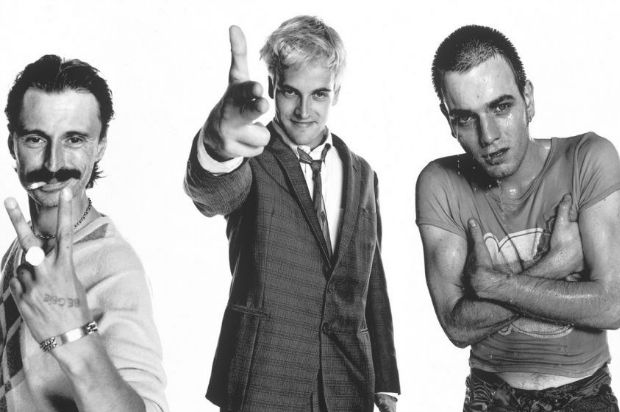You don’t have to be a Gen Xer to see the ‘90s as a great decade for culture from the U.S. and U.K.: Between the burgeoning of independent film, the snap of Britpop, the hazy harmonies of indie rock, and the maturing of electronic music, there was a lot of startlingly good stuff. And all of those streams came together in “Trainspotting,” the Danny Boyle film based on Irvine Welsh’s novel about a batch of Edinburgh lads united by heroin use. The opening scene, a kind of updating of the iconic Beatles crowd scenes in “A Hard Day’s Night,” this time to Iggy Pop’s “Lust for Life,” is one of numerous enduring sequences. (Songs by Pulp, Elastica, Brian Eno, and Lou Reed made the film even better.)
A sequel – based on “Porno,” the Welsh novel that picks up with the same characters a decade later — has been talked about for years now. But the film’s star Ewan McGregor (once estranged from Boyle, now reconciled) called the possibility a “terrible shame” years ago, and Boyle himself conceded that “Porno” is “not a great book in the way that ‘Trainspotting,’ the original novel, is genuinely a masterpiece.”
Now that Welsh has announced that he’s hoping to launch into “Trainspotting 2” with his original cast of Scottish addicts (including Robert Caryle’s very scary Begbie), those of us who love the ‘90s should be as excited as we were by the Pavement reunion, right?
Here’s what Rolling Stone reports:
The sequel will be based on the Trainspotting author Irvine Welsh’s 2002 novel Porno, which revisits the heroin-addicted characters a decade after the events of Trainspotting. John Hodge, the screenwriter of Trainspotting as well as Boyle’s A Less Life Ordinary and The Beach, has already penned the sequel’s script, with the Oscar-winning director calling it “terrific.” As the novel’s title suggest, the sequel will find the four main characters from the original embarking into the world of pornography.
In “Porno” (which I’ve not read), “Simon ‘Sick Boy’ Williamson returns to Edinburgh after failing with business ventures in London,” according to The Independent. “He enlists Renton for a final money-making scheme – to produce and direct a porno movie. Danny ‘Spud’ Murphy, meanwhile, has been attending therapy sessions to help him kick the heroin habit whilst Begbie, played by Carlyle, remains unhinged.” (Boyle has hedged a bit on how close he’ll get to the novel, telling Vulture in 2013 that, “You shouldn’t think of it as an adaptation of ‘Porno.’ It’s more like a ‘Trainspotting 2.’ There might be some characters we use from the book, but it’ll be its own thing, I think.”)
Boyle is a talented director and his cast of actors need no defense at this point. But I’m afraid I’ve got to side with McGregor and his “terrible shame” line: The original “Trainspotting” film, as messy and painful as it was, was perfect the way it was and its ending – with the characters mostly caught in a mix of moving toward respectability and continued self-destructiveness – was dramatically and sociologically perfect.
Why mess with the original, then? There are, of course, economic incentives for sequels and reboots and “reimaginings” and all the other ways to repackage films that have led not just to the Jonah Hill “21 Jump Street” but to “22 Jump Street” and “Dumber and Dumber To” and a new “Point Break.” I get it: This is the way the movie business works these days.
But “Trainspotting” was not an assembly-line comedy or effects-dominated action movie. Allow me to be hierarchical here: It was an art film, and one with a complete and self-contained arc (albeit a drugged-out and chaotic arc involving a trip through “the dirtiest toilet in Scotland.”). It’s the kind of movie you don’t mess with. A saga like “The Godfather” calls out for a sequel; “Trainspotting” doesn’t.
With Xers and others who went to movies in the ’90s still around, we’re likely to see more of this sort of thing. And not every arty ’90s film has to stand on its own — Richard Linklater’s two sequels to “Before Sunrise” attest to the power of revisiting two intriguing characters with unfinished business years years later. A lot of the decade’s culture does have staying power (and the Pavement reunion ended up being a really good idea.) But do we really want all of the great ‘90s indie films to be stretched thin, the way the Woodstock festival was turned into a franchise?
You can love an era and want parts of it left alone. Please, let’s stop the ‘90s nostalgia before it’s too late.
Watch Salon’s compilation of 13 terrible sequels to good movies: [jwplayer file=”http://media.salon.com/2015/09/terriblesequels.upadhye.09082015.mp4″ image=”http://media.salon.com/2015/09/Screen-Shot-2015-09-08-at-3.38.48-PM.jpg”][/jwplayer]

